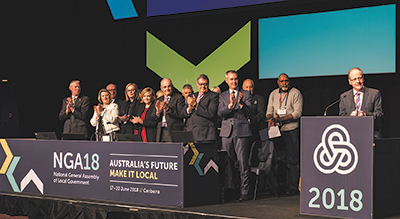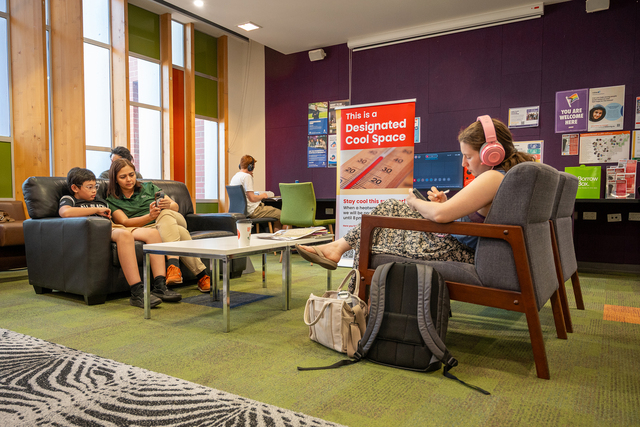A referendum on national recognition of Local Government was once again called for when almost 900 delegates congregated in Canberra last month for the annual National General Assembly of Local Government.
The theme ‘Australia’s future: make it local’ was the banner under which the country’s largest annual gathering of local government mayors, councillors and senior staff met to discuss the scope and importance of their sector.
Although the temperature outside was cool, inside the Canberra Convention Centre debate sizzled and the politics were passionate.
Providing a brief interlude, an impromptu 1960’s style protest choir crashed the venue hoping to put their message to attending federal ministers.
The real business of the congress, however, was happening inside the Assembly where the focus was on positioning local government in readiness for the upcoming Federal election.
In his opening address, President of the Australian Local Government Association (ALGA), Mayor David O’Loughlin, said that many councils now provide services and infrastructure that they did not provide 20 years ago because community expectations have changed; however, Commonwealth grants to local government have not kept pace with the increasing costs faced by councils.
“At the national level, the growth in Commonwealth taxation revenue has not been matched by a growth in distributions to local government. Even if we include the partnership payments from the Government through programs such as Roads to Recovery and the Bridges Renewal Program, we fall a long way short of the revenue we need.
“We must call for a better deal on federal funding for local government – that is one percent plus partnership programs.”
Diverse speakers
Keynote speakers addressed a range of current issues including the Australian political landscape, building communities of the future and disaster management.
Keynote speaker, Director of the 50/50 by 2030 Foundation, Adj. Prof. Virginia Hausegger AM, reasserted her challenge that more work is needed on gender inequality in local government to break through the 30 percent barrier where progress has stalled. The message was unchanged since her address to last year’s Australian Local Government Women’s Association (ALGWA) networking breakfast.
KPMG demographer and journalist, Bernard Salt AM, explored what small towns must have for their communities to thrive.
Mayor David Cull from the Local Government Association of New Zealand shared the lessons councils can learn from New Zealand’s disaster experiences.
Not surprisingly waste and recycling featured prominently. Tuesday’s concurrent session was well attended and a number of the motions carried by the Assembly carried the theme.
Electioneering
The Minister for Regional Development, Territories and Local Government, Hon John McVeigh, took the opportunity to outline the government’s policies and plans on how they would partner with local government to implement these policies on-the-ground.
Opposition Leader, the Hon Bill Shorten MP, spoke on developing a deeper, direct partnership with local government. He acknowledged receipt of 800 responses to last year’s challenge for each council to identify three shovel-ready projects and vows to use the information to inform policy and funding decisions into the next election.
Prime Minister, the Hon Malcolm Turnbull MP, briefly attended the conference dinner on Tuesday night, where he addressed the audience in the Ngunnawal language of the Canberra’s first people. He raised the idea of exploring a regional city deals model.
Deputy Leader of the Nationals, Minister for Sport, Rural Health, and Rural Communications, Senator the Hon Bridget McKenzie vowed that the Mobile Black Spots program was on target to fix 1000 rural communications problems by the year’s end.
Shadow Minister for Regional Services, Territories and Local Government, Mr Stephen Jones MP, affirmed Labor’s vision of a Local/Federal Government partnership in his address to the final assembly before the next federal election.
Voting on the motions
The motions put forward in the General Assembly reflected the ‘overarching and core campaign issue’, namely a call for the Federal Government to restore core base funding, Financial Assistance Grants, to one percent of Commonwealth taxation revenue and add funding for partnership programs where agreed.
In closing, Mayor O’Loughlin, urged all delegates to support their state and territory associations and, in turn, the national body, to ready the range of national priorities that the ALGA will advocate for in the upcoming federal election.
Resolutions passed at the Assembly can be found on the ALGA website at alga.asn.au

















